TELEMEDICINE หรือ การแพทย์ทางไกล กับการประยุกต์ใช้ในการดูแลผู้ป่วยในสถานพยาบาล
TELEMEDICINE, or remote medicine, and its application in patient care within healthcare facilities.
TELEMEDICINE หรือ บริการการแพทย์ทางไกล ตามนิยามประกาศกระทรวงสาธารณสุข เรื่อง มาตรฐานการให้บริการของสถานพยาบาลโดยใช้ระบบบริการการแพทย์ทางไกล พ.ศ. 2564 (ประกาศ ณ วันที่ 18 มกราคม 2564) “การบริการการแพทย์ทางไกล” หมายความว่า การให้บริการการแพทย์และสาธารณสุขของสถานพยาบาลแก่ผู้ขอรับบริการโดยผู้ประกอบวิชาชีพด้วยระบบบริการการแพทย์ทางไกลเพื่อแลกเปลี่ยนข้อมูลที่เป็นประโยชน์ต่อการปรึกษา การตรวจ การวินิจฉัย การรักษา การพยาบาลการป้องกันโรค การส่งเสริมสุขภาพและการฟื้นฟูสภาพร่างกาย และเพื่อประโยชน์สำหรับการศึกษาต่อเนื่องของบุคลากรทางการแพทย์และการสาธารณสุข “ระบบบริการการแพทย์ทางไกล” หมายความว่า ระบบงานที่มีการนำดิจิทัลมาใช้ในการให้บริการด้านการแพทย์และการสาธารณสุขที่อยู่ต่างสถานที่ด้วยวิธีการส่งสัญญาณข้อมูลภาพ และเสียง หรือวิธีการอื่นใด
TELEMEDICINE หรือ บริการการแพทย์ทางไกล ตามนิยามประกาศแพทยสภา ที่ 54/2563 เรื่อง แนวทางปฏิบัติการแพทย์ทางไกลหรือโทรเวช (TELEMEDICINE) และคลินิกออนไลน์ (ประกาศ ณ วันที่ 9 กรกฎาคม 2563) “โทรเวช” หรือ “การแพทย์ทางไกล” (TELEMEDICINE) หมายความว่า เป็นการส่งผ่านหรือการสื่อสารเนื้อหาทางการแพทย์แผนปัจจุบันโดยผู้ประกอบวิชาชีพเวชกรรมทั้งจากสถานพยาบาลภาครัฐและ/หรือเอกชนจากสถานที่หนึ่งไปยังอีกสถานที่หนึ่งโดยอาศัยวิธีการทางอิเล็กทรอนิกส์เพื่อให้การปรึกษา คำแนะนำ แก่ผู้ประกอบวิชาชีพเวชกรรม หรือบุคคลอื่นใด เพื่อการดำเนินการทางการแพทย์ในกรอบแห่งความรู้ทางวิชาชีพเวชกรรม ตามภาวะ วิสัย และพฤติการณ์ที่เป็นอยู่ ทั้งนี้ โดยความรับผิดชอบของผู้ส่งผ่านหรือการสื่อสารเนื้อหาทางการแพทย์นั้น ๆ
TELEMEDICINE, or remote medicine, and its application in patient care within healthcare facilities.
TELEMEDICINE, as defined by the Ministry of Public Health’s announcement on the service standards of healthcare facilities using telemedicine services in the year 2021 (announced on January 18, 2021), refers to the provision of medical and public health services by healthcare facilities to service recipients using telemedicine services. This is for the exchange of beneficial information for consultations, examinations, diagnoses, treatment, disease prevention, health promotion, physical recovery, and for the continuous education of medical and public health personnel. “Telemedicine services” mean the system that utilizes digital means to provide medical and public health services from different locations through the transmission of data, images, and sound or other methods.
TELEMEDICINE, as defined by the Medical Council’s announcement number 54/2563 regarding telemedicine and online clinics (announced on July 9, 2020), means the transmission or communication of current medical content by medical professionals in the field of medicine, both from public and private healthcare facilities, from one location to another through electronic means to provide consultations, advice, to medical professionals or other individuals for medical actions within the scope of medical knowledge, according to the circumstances, expertise, and conditions. It is the responsibility of the transmitter or communicator of medical content.
TELEMEDICINE กับการดูแลผู้ป่วย
TELEMEDICINE ถูกนำมาใช้ในการดูแลผู้ป่วยอย่างแพร่หลาย โดยเฉพาะเมื่อเกิดสถานการณ์การแพร่ระบาดของโควิด ในประเทศไทยมีการนำระบบ TELEMEDICINE มาใช้อย่างแพร่หลาย ตัวอย่างเช่น
TELEMEDICINE ของโรงพยาบาลพระนครศรีอยุธยา ได้ดำเนินการจัดตั้งศูนย์บริการการแพทย์ทางไกล (Telehealth Center) ขึ้นเป็นการเฉพาะ โดยจัดตั้งห้องการแพทย์ทางไกลแห่งแรกของโรงพยาบาลรัฐ เมื่อช่วงปีที่ผ่านมา โดยจัดทำระบบการแพทย์ทางไกล เพื่อให้บริการผู้ป่วยหลายกลุ่มโรค เช่น โรคไต โรคเบาหวาน โรคความดันโลหิตสูง การดูแลด้านจิตเวช รวมถึงในช่วงที่ผ่านมาได้ดูแลผู้ป่วยโควิดด้วยการแพทย์ทางไกล (Home Isolation) มากกว่า 16,000 คน ผลการดูแลรักษาพบว่าสามารถติดตามอาการคนไข้ได้อย่างสะดวก รวดเร็ว มีการรองรับระบบแชทและวีดีโอคอล คนไข้พึงพอใจเพราะสามารถลดค่าใช้จ่ายในการเดินทาง ลดเวลารอคอย โรงพยาบาลและบุคลากรลดความแออัดในโรงพยาบาล ศูนย์บริการการแพทย์ทางไกล (Telehealth Center) ของโรงพยาบาลพระนครศรีอยุธยา พัฒนาโดย www.dietz.asia รองรับการเบิกจ่ายสิทธิการรักษาจากสปสช.
นอกจากนี้ TELEMEDICINE ในโรงพยาบาลพระนครศรีอยุธยา ยังดำเนินการกับผู้ต้องขังในเรือนจำ เพื่อช่วยติดตามให้ให้การดูแลผู้ป่วยโรคเรื้อรังในเรือนจำผ่านระบบ TELEMEDICINE ได้ เช่น ผู้ป่วยโรคเบาหวาน โรคความดันโลหิตสูง
TELEMEDICINE and Patient Care
TELEMEDICINE has been widely used in patient care, especially during the COVID-19 pandemic. In Thailand, TELEMEDICINE systems have been widely adopted. For example,
The Phra Nakhon Si Ayutthaya Hospital has established a Telehealth Center, setting up the first remote medical consultation room in a state-run hospital over the past year. They’ve developed a TELEMEDICINE system to provide services to various patient groups, such as those with kidney disease, diabetes, high blood pressure, and mental health concerns. In recent times, they have used TELEMEDICINE to care for more than 16,000 COVID-19 patients through home isolation. The results have shown that it enables convenient and rapid monitoring of patients’ conditions, with support for chat and video calls. Patients are satisfied because it reduces travel expenses, waiting times, and eases the strain on hospitals. The Telehealth Center at Phra Nakhon Si Ayutthaya Hospital was developed by www.dietz.asia and supports billing for treatment from the National Health Security Office (NHSO).
Furthermore, TELEMEDICINE at Phra Nakhon Si Ayutthaya Hospital is also being used to assist in monitoring and caring for inmates in correctional facilities, including those with chronic conditions such as diabetes and high blood pressure.
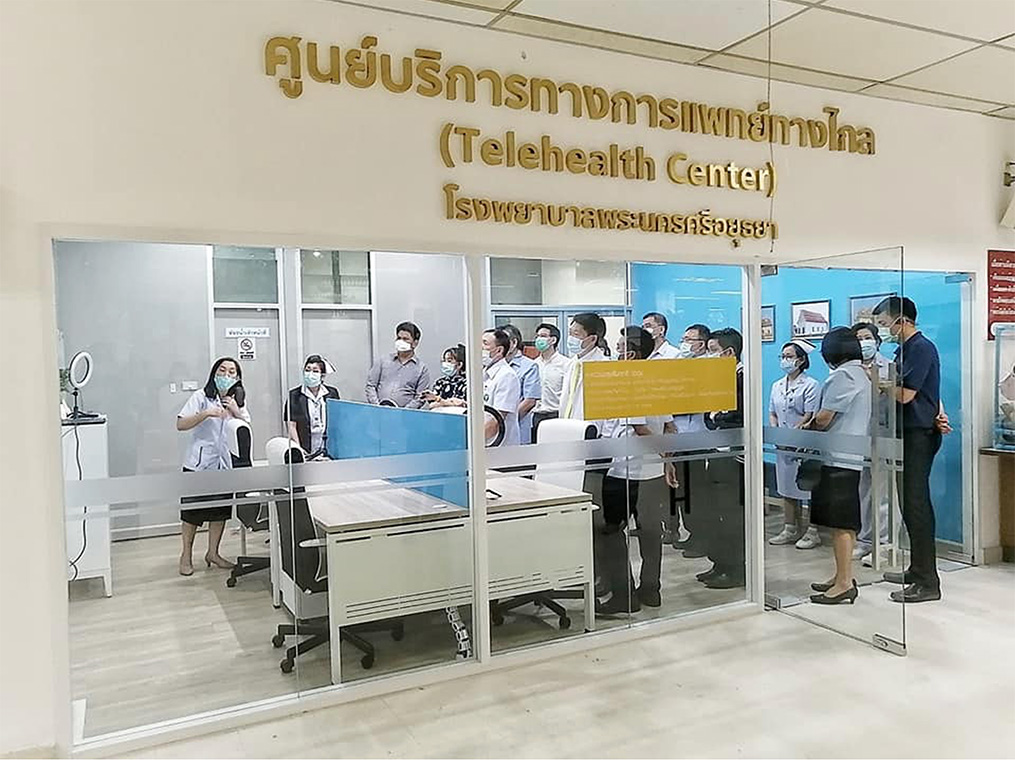
“ภาพระบบ TELEMEDICINE โรงพยาบาลพระนครศรีอยุธยา”
ศูนย์บริการการแพทย์ทางไกล
“TELEMEDICINE System at Phra Nakhon Si Ayutthaya Hospital” Telehealth Center
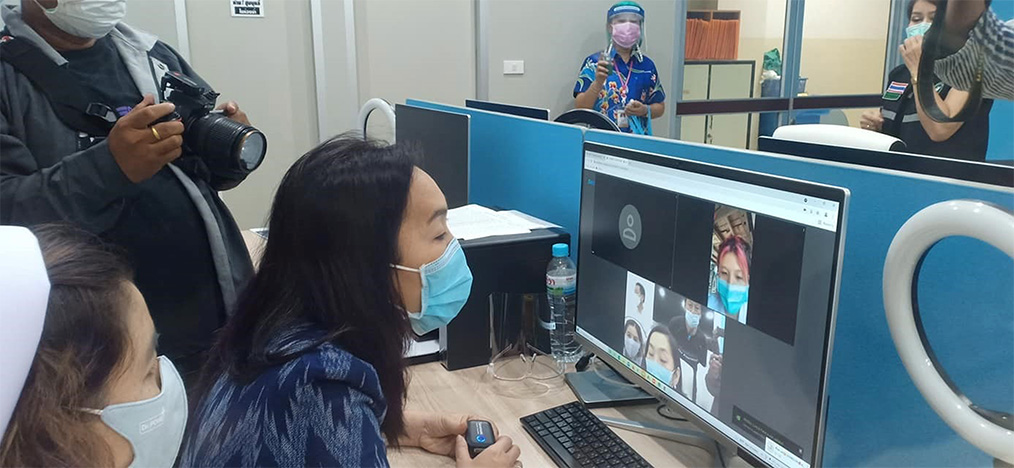
“ภาพระบบ TELEMEDICINE โรงพยาบาลพระนครศรีอยุธยา”
พญ.เสาวลักษณ์ ชาวโพนทอง อายุรแพทย์โรคไต ให้การดูแลผู้ป่วยช่วงโควิด 19 ด้วยระบบ TELEMEDICINE
“TELEMEDICINE System at Phra Nakhon Si Ayutthaya Hospital” Dr. Saowalak Chaow Phonthong, a nephrologist, provides patient care during the COVID-19 period using the TELEMEDICINE system.
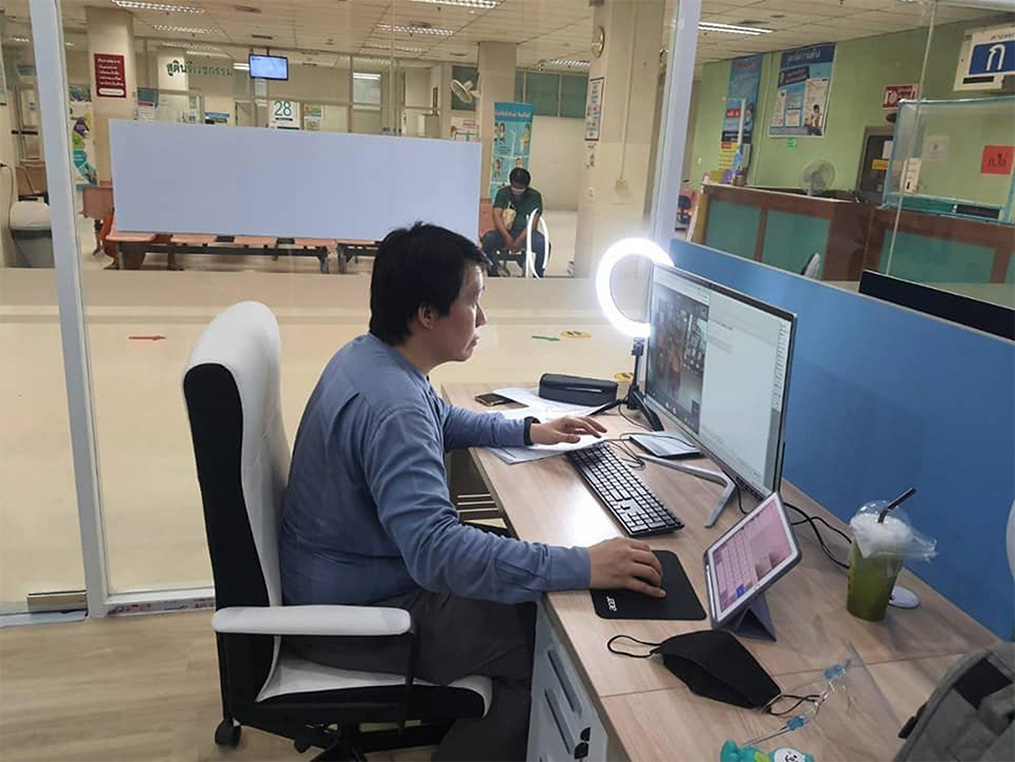
“ภาพระบบ TELEMEDICINE โรงพยาบาลพระนครศรีอยุธยา”
นายแพทย์ธาตรี โบสิทธิพิเชฎฐ์ แพทย์เวชศาสตร์ครอบครัว ให้การดูแลผู้ป่วยโรคเรื้อรังในเรือนจำ ด้วยระบบ TELEMEDICINE
“TELEMEDICINE System at Phra Nakhon Si Ayutthaya Hospital” Dr. Thattree Bosritthiphichet, a family medicine practitioner, cares for inmates with chronic conditions in correctional facilities using the TELEMEDICINE system.
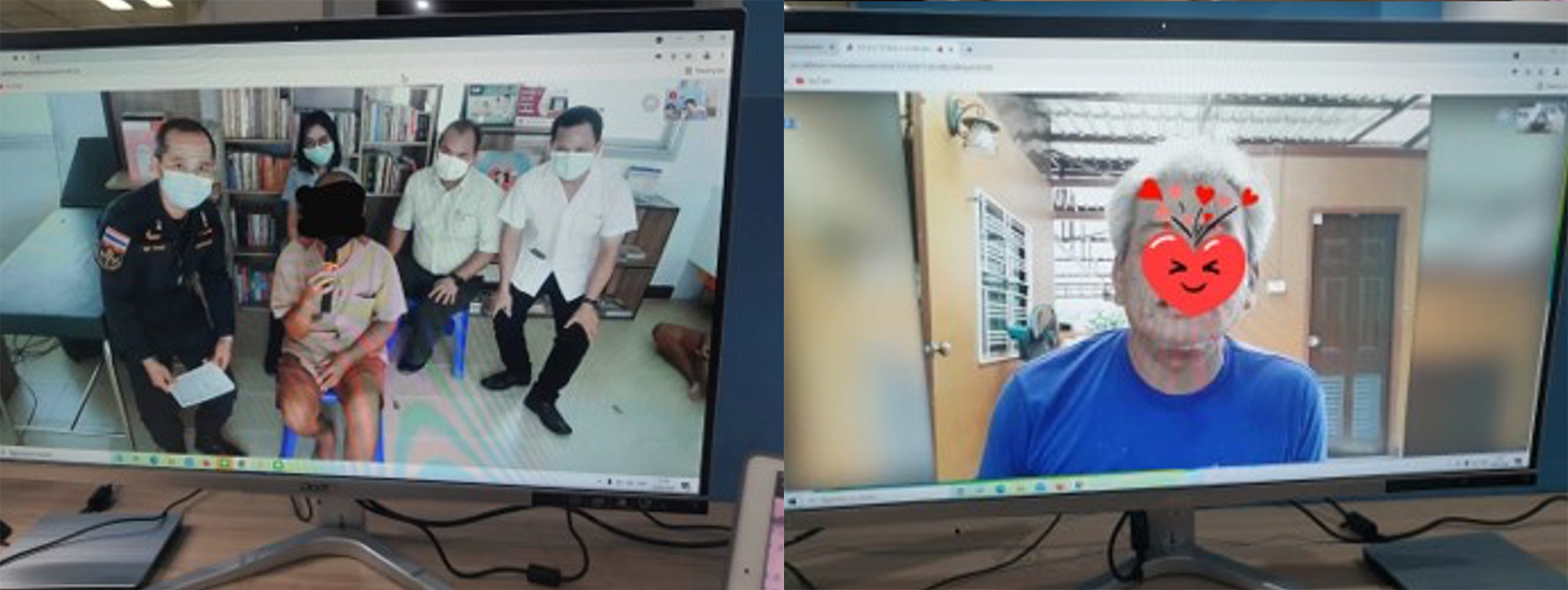
“ภาพระบบ TELEMEDICINE โรงพยาบาลพระนครศรีอยุธยา”
การดูแลผู้ป่วยโรคเรื้อรังในเรือนจำ ด้วยระบบ TELEMEDICINE
“TELEMEDICINE System at Phra Nakhon Si Ayutthaya Hospital” Patient care for inmates with chronic conditions in correctional facilities using the TELEMEDICINE system.
ดูแลผู้ป่วยเบาหวานขณะตั้งครรภ์ด้วย TELEMEDICINE
ผู้ป่วยเบาหวานขณะตั้งครรภ์ต้องเดินทางมาพบแพทย์เพื่อติดตามภาวะน้ำตาลในเลือดเป็นประจำเกือบทุกสัปดาห์ รวมถึงต้องได้รับความรู้ในการดูแลตนเอง การควบคุมปริมาณคาร์โบไฮเดรตในอาหาร ให้สอดคล้องกับระดับน้ำตาลในเลือดและยาฉีดอินซูลินที่ได้รับ การเดินทางมาโรงพยาบาลทำให้ประสบปัญหาความเสี่ยงต่อการติดเชื้อโควิดและเชื้อโรคในโรงพยาบาล เกิดภาระค่าใช้จ่ายและเวลาที่เพิ่มมากขึ้น
โรงพยาบาลพุทธโสธร เป็นโรงพยาบาลของรัฐบาล ประจำจังหวัดฉะเชิงเทรา ตั้งอยู่ภาคตะวันออกของประเทศไทย ปัจจุบันมีขนาด 585 เตียง โรงพยาบาลพุทธโสธรจึงได้นำเอาการแพทย์ทางไกล หรือ TELEMEDICINE ของไดเอทซ์ใช้ในการดูแลคนไข้เบาหวานขณะตั้งครรภ์ (และเบาหวานชนิดที่ 1 หรือ ชนิดที่ 2 ที่ต้องฉีดอินซูลิน) โดยให้ผู้ป่วยที่ประเมินแล้วว่าสามารถใช้การติดตามผ่านระบบไดเอทซ์เทเลเมดิซีนได้ ส่งข้อมูลระดับน้ำตาลในเลือด ปริมาณยาที่ฉีด อาหารที่รับประทาน ปริมาณคาร์โบไฮเดรตที่รับประทาน ผ่านทางระบบไดเอทซ์ ก่อนถึงกำหนดที่นัดหมายในแต่ละสัปดาห์ (ในกรณีนี้เป็นวันจันทร์) เมื่อถึงกำหนดแพทย์จะดูข้อมูลที่ส่งมาและวิเคราะห์ ประเมินการรักษา และให้คำแนะนำผ่านระบบแชทได้อย่างสะดวก โดยผู้ป่วยไม่ต้องเดินทางมาโรงพยาบาล รวมถึงพยาบาลสามารถให้คำแนะนำในการปฏิบัติตัวของคนไข้ นักกำหนดอาหารสามารถให้คำแนะนำด้านการรับประทานอาหารและโภชนาการ เภสัชกรสามารถให้คำแนะนำด้านการใช้ยากับผู้ป่วยได้
“Managing Pregnant Patients with Diabetes Using TELEMEDICINE”
Pregnant patients with diabetes often need to travel to meet with a physician regularly to monitor their blood sugar levels. They must also receive education on self-care, managing carbohydrate intake, aligning it with blood sugar levels, and administering insulin injections as prescribed. Traveling to the hospital can pose a risk of exposure to COVID-19 and other diseases, increasing costs and time spent.
Phutthasothorn Hospital, a government hospital in Chachoengsao province, located in the eastern region of Thailand, with a capacity of 585 beds, has implemented TELEMEDICINE by Dietz for the care of pregnant patients with diabetes (Type 1 or Type 2 requiring insulin injections). Patients who are assessed as suitable for remote monitoring through the Dietz Telemedicine system send data, including blood sugar levels, insulin doses, dietary intake, and carbohydrate consumption, via the Dietz system before their scheduled weekly appointments (usually on Mondays). When the appointment time arrives, the physician reviews the submitted data, analyzes the treatment, and provides guidance through a convenient chat system. Patients do not need to travel to the hospital, and the healthcare team can offer guidance on patient self-management. Dietitians can provide advice on dietary intake and nutrition, and pharmacists can provide guidance on medication usage for patients.
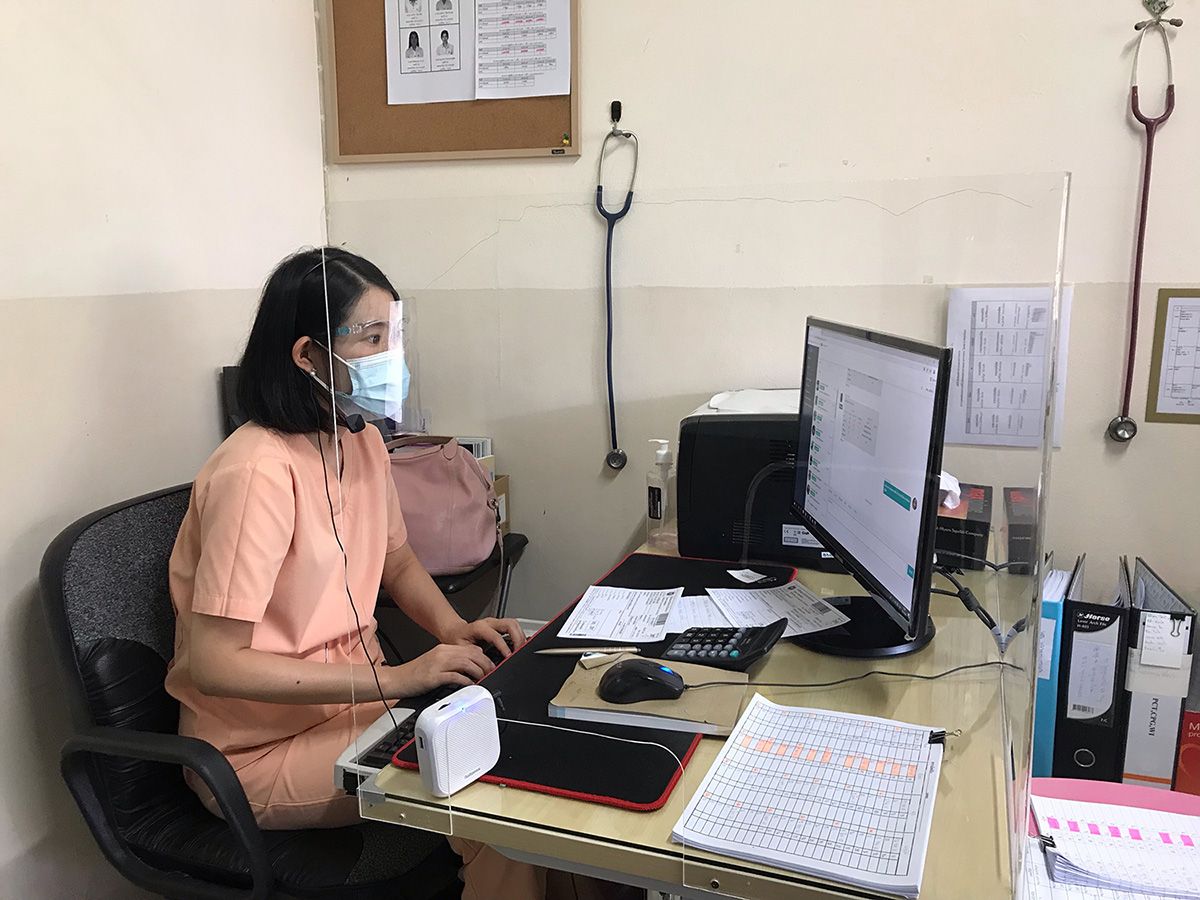
พญ.อรณิชา อมรอริยะกูล อายุรแพทย์ต่อมไร้ท่อและเมตะบอลิซึม โรงพยาบาลพุทธโสธร
ให้บริการ TELEMEDICINE กับผู้ป่วยเบาหวานขณะตั้งครรภ์
Dr. Oranicha Amraariyakul, an endocrinologist and metabolism specialist at Phutthasothorn Hospital, provides TELEMEDICINE services to pregnant patients with diabetes.
การแพทย์ทางไกล เชื่อมโยงหน่วยบริการปฐมภูมิกับตติยภูมิ
โรงพยาบาลร้อยเอ็ดร่วมกับโรงพยาบาลชุมชน ในจังหวัดร้อยเอ็ด เช่น โรงพยาบาลสุวรรณภูมิ โรงพยาบาลโพนทอง โรงพยาบาลเสลภูมิ เป็นต้น นำระบบ TELEMEDICINE ดูแลผู้ป่วยเวชศาสตร์ฟื้นฟู ผู้ป่วยสมองและระบบประสาท รวมถึงโรคเรื้อรัง เช่น โรคไต โรคเบาหวาน และการดูแลแบบประคับประคอง (palliative care) ช่วยให้ผู้ป่วยเข้าถึงแพทย์เฉพาะทางได้สะดวกรวดเร็วขึ้น โดยไม่ต้องเดินทางมาที่โรงพยาบาลร้อยเอ็ดในอำเภอเมือง แต่สามารถติดตามอาการที่โรงพยาบาลชุมชนใกล้บ้านได้อย่างมีประสิทธิภาพ
Telemedicine connects primary care units with specialized hospitals in the Roi Et province. For example, Roi Et Hospital collaborates with local community hospitals such as Suwannaphum Hospital, Phon Thong Hospital, and Selaphum Hospital. They utilize the TELEMEDICINE system to provide medical care for patients recovering from various medical conditions, including neurological disorders and chronic diseases such as kidney disease and diabetes, along with palliative care. This allows patients to conveniently and quickly access specialist doctors without the need to travel to Roi Et Hospital in the city but rather effectively monitor their condition at nearby community hospitals.
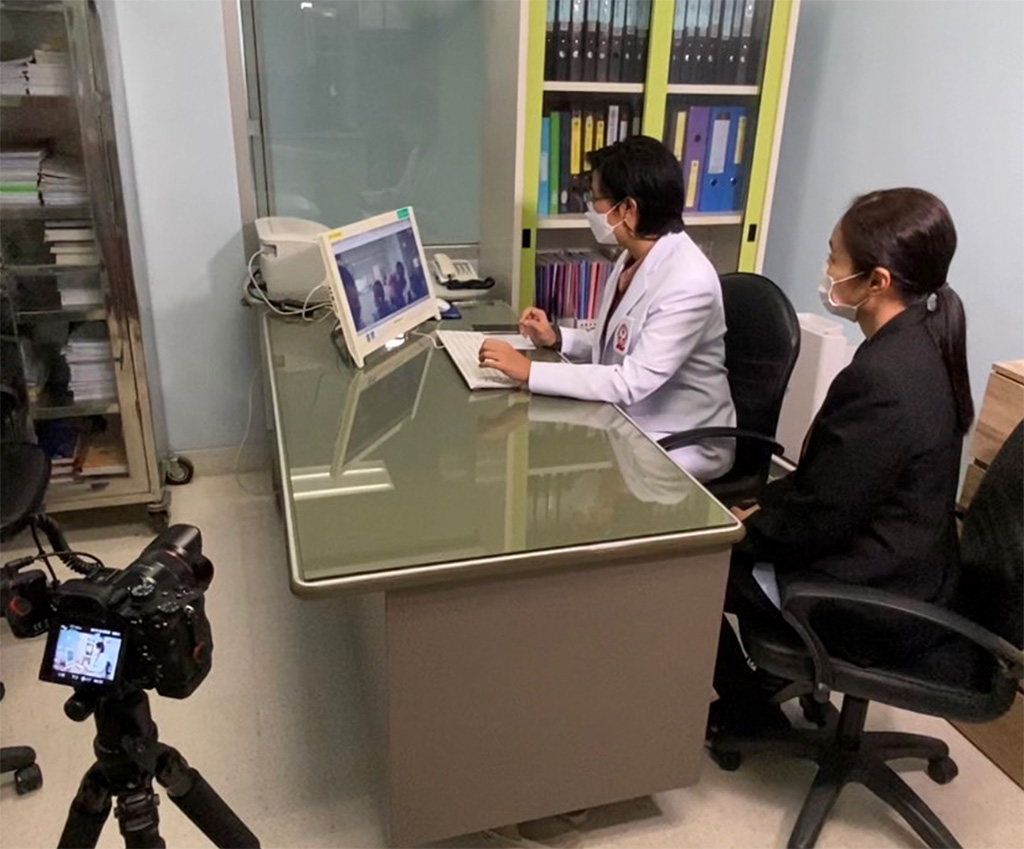
“ภาพการทดลองระบบการแพทย์ทางไกล”
ระหว่างโรงพยาบาลร้อยเอ็ด และ โรงพยาบาลสุวรรณภูมิ ที่มีระยะทางห่างกันมากกว่า 54 กิโลเมตร จากเดิมคนไข้ต้องเดินทางมาติดตามอาการที่โรงพยาบาลร้อยเอ็ด แต่เมื่อปรับมาใช้บริการการแพทย์ทางไกล คนไข้สามารถเข้ารับบริการที่โรงพยาบาลสุวรรณภูมิ เพื่อเข้าพบแพทย์เฉพาะทางที่นัดหมายไว้ของโรงพยาบาลร้อยเอ็ดได้
“Remote Medical System Test Image”
Between Roi Et Hospital and Surin Hospital, which are more than 54 kilometers apart, patients used to have to travel to Roi Et Hospital for medical consultations. However, since adopting remote medical services, patients can receive care at Surin Hospital, meeting with the specialized physicians scheduled by Roi Et Hospital.
กฎหมายที่เกี่ยวข้องกับ TELEMEDICINE
กฎหมายที่เกี่ยวข้องกับ TELEMEDICINE ประกอบด้วยประกาศกระทรวงสาธารณสุขและสภาวิชาชีพ
The laws related to TELEMEDICINE consist of announcements from the Ministry of Public Health and the Medical Council.
- ประกาศกระทรวงสาธารณสุข. เรื่อง มาตรฐานการให้บริการของสถานพยาบาลโดยใช้ระบบบริการการแพทย์ทางไกล พ.ศ. 2564 (ประกาศ ณ วันที่ 18 มกราคม 2564)
ประกาศฉบับนี้กำหนดมาตรฐานของสถานพยาบาลภาคเอกชนที่จะให้การบริการ โดยใช้ระบบบริการการแพทย์ทางไกล เพื่อคุ้มครองความปลอดภัยของผู้รับบริการในสถานพยาบาล ผู้รับอนุญาตและผู้ดำเนินการสถานพยาบาล ต้องยื่นแบบคำขอบริการเพิ่มเติมบริการการแพทย์ทางไกลของการให้บริการที่พัฒนาขึ้นในสถานพยาบาลต่อผู้อนุญาต ตามแบบคำขอเปลี่ยนแปลงการประกอบกิจการสถานพยาบาลตามแบบ ส.พ. 16
Announcement from the Ministry of Public Health regarding the standards for providing services by using telemedicine, B.E. 2564 (announced on 18th January 2021).
This announcement sets the standards for private healthcare facilities to provide services using telemedicine, ensuring the safety of service recipients in healthcare facilities. Authorized recipients and operators of healthcare facilities must submit an application for additional telemedicine services to provide services developed within healthcare facilities to authorized recipients, following the application format provided in form S.P. 16.
- ประกาศแพทยสภา ที่ 54/2563 เรื่อง แนวทางปฏิบัติการแพทย์ทางไกลหรือโทรเวช (TELEMEDICINE) และคลินิกออนไลน์ (ประกาศ ณ วันที่ 9 กรกฎาคม 2563)
ประกาศฉบับนี้กำหนดเนื้อหาสำคัญคือ คลินิกออนไลน์ และการให้บริบาลผ่านระบบบริบาลโทรเวช หรือบริบาลการแพทย์ ทางไกล (TELEMEDICINE) จำเป็นต้องดำเนินการผ่านสถานพยาบาลเท่านั้น การให้บริบาลผ่านระบบบริบาลโทรเวช หรือบริบาลการแพทย์ทางไกล จะต้อง เป็นไปตามเกณฑ์ที่กำหนด เช่น เกณฑ์มาตรฐานผู้ประกอบวิชาชีพเวชกรรมของแพทยสภา พ.ศ. 2555 เกณฑ์ความรู้ความสามารถในการประเมินเพื่อรับใบอนุญาตเป็นผู้ประกอบวิชาชีพเวชกรรม พ.ศ. 2555 และที่แก้ไขเพิ่มเติม พ.ศ. 2563 เกณฑ์หรือแนวทางที่แพทยสภากำหนดขึ้นตามกรอบแห่งกฎหมายวิชาชีพเวชกรรม การปรึกษาระหว่างผู้ประกอบวิชาชีพเวชกรรมหรือบุคลากรสาธารณสุขอื่นที่มี กฎหมายอื่นกำหนดไว้เป็นการเฉพาะ ไม่ถือว่าเป็นการให้บริบาลโทรเวชหรือการแพทย์ทางไกล ผู้ให้บริบาลและผู้รับบริบาลพึงตระหนักรู้ และต้องรับทราบถึงข้อจำกัดด้านเทคโนโลยี และอิเล็กทรอนิกส์ ผู้ให้บริบาลและผู้รับบริบาล ต้องทราบว่ากิจกรรมที่ดำเนินการผ่านระบบสารสนเทศ มีความเสี่ยงจาก ระบบสารสนเทศด้วย จึงต้องทำภายใต้ระบบสารสนเทศที่มีมาตรฐานและความปลอดภัยด้านสารเทศ ที่เป็นสากล และได้รับการดูแลให้พร้อมใช้งาน และพร้อมรับการตรวจสอบ ระบบสารสนเทศที่ใช้ดำเนินการโทรเวช ต้องได้รับมาตรฐานความปลอดภัยสารสนเทศ และสอดคล้องกับพระราชบัญญัติธุรกรรมอิเล็กทรอนิกส์ พ.ศ. 2562 และพระราชบัญญัติคุ้มครอง ข้อมูลส่วนบุคคล พ.ศ. 2562 หรือกฎหมายที่เกี่ยวข้อง เป็นต้น
Announcement of the Medical Council No. 54/2563 regarding Guidelines for Remote Medical Practice or Telemedicine and Online Clinics (announced on July 9, 2020).
This announcement emphasizes online clinics and the provision of care through remote medical services, or telemedicine. Such activities must be carried out exclusively through healthcare facilities. The provision of care through remote medical services or telemedicine must comply with specified criteria, such as the standards for medical professionals set by the Medical Council in 2012 and the knowledge and ability criteria for obtaining a medical professional license in 2012, as amended in 2020. The guidelines and regulations provided by the Medical Council should be followed, as well as any legal requirements that may apply to specific cases. It should be noted that consultations between medical professionals or other public health personnel, governed by separate laws, do not constitute the provision of remote medical care. Providers and recipients of remote medical care must be aware of technological limitations and electronic risks. Activities carried out through information systems are inherently subject to information system risks. Therefore, they should be conducted within information systems that meet international standards and security requirements for information systems. These systems should be ready for use and subject to regular inspection. Information systems used for telemedicine must comply with information security standards and be in accordance with the Electronic Transactions Act of 2019 and the Personal Data Protection Act of 2019, as well as other relevant laws and regulations.
- ประกาศสภาเภสัชกรรม ที่ 56/2563 เรื่อง การกำหนดมาตรฐานและขั้นตอนการให้บริการเภสัชกรรมทางไกล (Telepharmacy) ประกาศ ณ วันที่ 2 มิถุนายน 2563
กำหนดนิยามการให้บริการเภสัชกรรมทางไกล (Telepharmacy) คือ การบริการทางเภสัชกรรม (Pharmaceuticalcare) และ การให้บริการที่เกี่ยวเนื่องแก่ผู้ป่วยหรือผู้รับบริการ โดยผู้ประกอบวิชาชีพเภสัชกรรมสามารถสื่อสารกับผู้ป่วยหรือผู้รับบริการได้ด้วยเทคโนโลยีการสื่อสาร (Telecommunication) รวมทั้งการส่งมอบยา โดยมีรายละเอียดตามประกาศ เช่น มาตรฐานการให้บริการเภสัชกรรมทางไกล มีขั้นตอนการปฏิบัติงานเภสัชกรรมทางไกลของเภสัชกร กรณีเป็นสถานพยาบาล กรณีร้านยาที่ได้รับใบสั่งยา และกรณีร้านยาที่ให้บริการ โดยไม่ได้รับใบสั่งยา
Announcement of the Pharmacy Council No. 56/2563 regarding the establishment of standards and procedures for Telepharmacy services (Telepharmacy), announced on June 2, 2020.
This announcement defines Telepharmacy as the provision of Pharmaceutical care and services related to patients or service recipients by professional pharmacists communicating with patients or service recipients through telecommunication technology. It also includes the delivery of medication, with details specified in the announcement. These details encompass standards for Telepharmacy services and the procedures for remote pharmacy practice by pharmacists. The announcement covers cases in healthcare facilities, cases for pharmacies that have received medication orders, and cases for pharmacies providing services without medication orders.
- ประกาศสภาการพยาบาล เรื่อง แนวทางการพยาบาลทางไกล (Tele-nursing) ประกาศ ณ วันที่ 27 พฤศจิกายน 2563
อ้างอิง https://www.tnmc.or.th/images/userfiles/files/T_0049.PDF
กำหนดนิยามการพยาบาลทางไกล (Tele-nursing)” หมายความว่า การพยาบาลและการผดุงครรภ์เพื่อให้คำปรึกษาและแก้ปัญหาเกี่ยวกับสุขอนามัยภายใต้กรอบความรู้แห่งวิชาชีพการพยาบาลและการผดุงครรภ์ โดยนำระบบดิจิทัลมาใช้ในการให้บริการ ทั้งนี้ โดยความรับผิดชอบของผู้ให้การพยาบาลทางไกล
องค์ประกอบในการให้การพยาบาลทางไกล ประกอบด้วยการดำเนินการของ สถานพยาบาลที่ให้การพยาบาลทางไกล ผู้ให้การพยาบาลทางไกล ผู้รับการพยาบาลทางไกล และมีแนวทางปฏิบัติการให้การพยาบาลทางไกล เช่น ต้องมีการยืนยันตัวตนของผู้ให้การพยาบาลทางไกล และผู้รับการพยาบาลทางไกลภายใต้มาตรฐานสารสนเทศของสถานพยาบาลนั้น ประเมินผู้รับการพยาบาลทางไกลโดยการทบทวนจากประวัติสุขภาพเดิม และประเมินภาวะสุขภาพเพิ่มเติมวิเคราะห์ข้อมูลและวินิจฉัยการพยาบาล โดยประเมินอาการและความรุนแรง ความเสี่ยงข้อจำกัดและเงื่อนไขในการประกอบวิชาชีพ และเกณฑ์ที่สภาการพยาบาลประกาศ วางแผนการพยาบาลและให้การพยาบาล จากผลการวิเคราะห์ข้อมูล บันทึกการพยาบาลทางไกลที่ให้แก่ผู้รับการพยาบาลทางไกล ประเมินผลการให้การพยาบาลทางไกล ประสานการส่งต่อเมื่อประเมินแล้วพบว่าผู้รับการพยาบาลทางไกลควรไปรับบริการในสถานพยาบาลที่มีศักยภาพที่เหมาะสมกับอาการหรือปัญหาสุขภาพของผู้รับการพยาบาลทางไกล
การปรึกษาระหว่างผู้ประกอบวิชาชีพการพยาบาลและการผดุงครรภ์กับบุคลากรสาธารณสุขอื่น ที่มีกฎหมายอื่นกำหนดไว้เป็นการเฉพาะ ไม่ถือว่าเป็นการพยาบาลทางไกลตามประกาศนี้
Announcement of the Nursing Council No. 56/2563 regarding Tele-nursing Guidelines, announced on November 27, 2020.
The definition of “Tele-nursing” is provided in this announcement, which refers to nursing and midwifery services for consultation and problem-solving related to health within the framework of professional nursing and midwifery knowledge, utilizing digital systems to deliver services. The responsibility of Tele-nursing providers is outlined.
Tele-nursing services involve the following components: healthcare facilities providing Tele-nursing services, Tele-nursing providers, recipients of Tele-nursing care, and guidelines for Tele-nursing practices. These guidelines include identity verification of Tele-nursing providers and recipients under the information standards of the healthcare facility, assessing Tele-nursing recipients through a review of their medical history, additional health assessments, data analysis, and nursing diagnosis. This involves evaluating symptoms, severity, limitations, and conditions for professional practice, in accordance with criteria specified by the Nursing Council.
Planning nursing care and providing nursing care based on data analysis are also included in the Tele-nursing guidelines. Documenting Tele-nursing care provided to recipients and evaluating the outcomes of Tele-nursing are part of the process. Referrals are coordinated when it is determined that Tele-nursing recipients should seek care in healthcare facilities appropriate for their condition or health issues.
Consultations between nursing and midwifery professionals and other public health personnel, governed by separate laws, are not considered Tele-nursing as defined in this announcement.
- ประกาศสภาเทคนิคการแพทย์เรื่องมาตรฐานการให้บริการงานเทคนิคการแพทย์ทางไกล (Tele-medical labs) พ.ศ.2563 ประกาศ ณ วันที่ 8 ตุลาคม 2563
“การให้บริการงานเทคนิคการแพทย์ทางไกล”(Tele-Medical Labs) หมายความว่าการให้บริการด้านเทคนิคการแพทย์รูปแบบหนึ่งแก่ผู้รับบริการโดยผู้ประกอบวิชาชีพเทคนิคการแพทย์ในสถานพยาบาล ด้วยระบบเทคโนโลยีการสื่อสารทางไกล (Telecommunication) เพื่อแลกเปลี่ยนข้อมูลและสื่อสารกับผู้ป่วยหรือผู้รับบริการในการรายงานผล การแปลผลการทดสอบ และการให้คำปรึกษาก่อนและหลังการตรวจ เพื่อการวินิจฉัย การติดตามการรักษาหรือเพื่อการประเมินภาวะสุขภาพ รวมถึงการดูแลสร้างเสริมสุขภาพ ให้คำแนะนำกับผู้ให้บริการอื่นในเรื่องการตรวจวิเคราะห์ และให้หมายความรวมถึงการให้คำแนะนำการตรวจด้วยตนเอง (Self-test) ในรายการตรวจที่ชุดตรวจได้รับอนุญาตให้จำหน่ายได้ตามกฎหมายแล้ว เช่น การใช้เครื่องตรวจน้ำตาลปลายนิ้ว การตรวจภาวะตั้งครรภ์ ทั้งนี้ การให้บริการดังกล่าวไม่รวมถึงการให้บริการกรณีผู้ป่วยวิกฤตฉุกเฉิน
มาตรฐานการให้บริการงานเทคนิคการแพทย์ทางไกล (Tele- Medical labs) การให้บริการต้องดำเนินการโดยผู้ประกอบวิชาชีพเทคนิคการแพทย์ ผู้รับบริการต้องให้ความยินยอม ในการรับบริการงานเทคนิคการแพทย์ทางไกลโดยการบันทึกเสียงหรือวิธีอื่น จัดให้มีระบบการขึ้นทะเบียนผู้ป่วย และบันทึกประวัติผู้ป่วยและการให้บริการ จัดให้มีอุปกรณ์การสื่อสารโทรคมนาคมเทคโนโลยีที่สามารถสื่อสาร ระหว่างผู้ให้บริการและผู้รับบริการ จัดให้มีระบบการบันทึกข้อมูลเสียงหรือวิดีโอในขณะให้บริการที่สามารถรักษาความลับข้อมูลของผู้รับบริการโดยผู้ประกอบวิชาชีพเทคนิคการแพทย์ซึ่งได้รับความยินยอมจากผู้รับบริการในการเข้าถึงข้อมูลของผู้รับบริการได้ การให้บริการด้านการรายงานผลการตรวจวิเคราะห์ สามารถรายงานผ่านระบบการสื่อสารโทรคมนาคมด้วยการส่งข้อมูลทางอิเล็กทรอนิกส์ กรณีการรายงานผลด้วยวาจาทางโทรศัพท์ (verbal) ต้องมีอิเล็กทรอนิกส์ไฟล์ ประกอบด้วย เพื่อป้องกันการผิดพลาดจากการสื่อสาร การให้คำแนะนำการตรวจด้วยตนเอง (Self-test) ประกอบด้วย ขั้นตอนการใช้งานชุดตรวจด้วยตนเอง ข้อควรระวัง การอ่านผล การแปลผล การควบคุมคุณภาพผลการตรวจวิเคราะห์และบันทึกต่างๆ ที่เกี่ยวข้อง (ถ้ามี)
Announcement of the Medical Technology Council regarding Tele-medical Labs service standards, issued on October 8, 2020.
“Tele-Medical Labs” refers to a form of medical technology service provided to service recipients by professional medical technologists in healthcare facilities, using telecommunication technology to exchange information and communicate with patients or service recipients for the purpose of reporting test results, interpreting test results, and providing pre- and post-examination consultation for diagnosis, treatment follow-up, health assessment, and health promotion. This includes guidance to service providers on self-testing for specific test kits that have been authorized for distribution according to the law, such as using a blood glucose monitor and pregnancy tests. The provision of this service excludes cases involving critically ill patients.
The service standards for Tele-Medical Labs stipulate that services must be provided by professional medical technologists. Service recipients must provide their consent to receive Tele-Medical Labs services, which can be documented through voice recordings or other means. The healthcare facility must establish a patient registration system and maintain records of patient history and service provision.
The service should be equipped with telecommunication technology that allows communication between service providers and service recipients. The service should also have a data recording system for voice or video during service provision. This system should protect the confidentiality of patient information, ensuring that medical technologists, who have received consent from the service recipient, can access the information.
Reporting test results can be done electronically through telecommunications systems, while verbal reports made over the phone must have corresponding electronic files to prevent communication errors.
For self-testing guidance, it should include steps for self-testing, precautions, result interpretation, quality control of test results, and any related documentation, if applicable.
- ประกาศสภากายภาพบำบัด เรื่อง มาตรฐานการให้บริการกายภาพบำบัดทางไกลของสถานพยาบาล พ.ศ. 2564 ประกาศ ณ วันที่ 3 มีนาคม 2564
“ระบบบริการกายภาพบำบัดทางไกล” หมายความว่า ระบบงานที่มีการนำดิจิทัลมาใช้ในการให้บริการด้านกายภาพบำบัดที่อยู่ต่างสถานที่ด้วยวิธีการส่งสัญญาณข้อมูลภาพและเสียง หรือวิธีการอื่นใด
“บริการกายภาพบำบัดทางไกล” หมายความว่า การให้บริการกายภาพบำบัดของสถานพยาบาลแก่ผู้ขอรับบริการโดยผู้ประกอบวิชาชีพกายภาพบำบัดด้วยระบบบริการกายภาพบำบัดทางไกล เพื่อแลกเปลี่ยนข้อมูลที่เป็นประโยชน์ต่อการปรึกษา การตรวจ การวินิจฉัย การรักษา การป้องกันโรค การส่งเสริมสุขภาพและการฟื้นฟูสภาพร่างกาย และเพื่อประโยชน์สำหรับการศึกษาต่อเนื่องของบุคลากรทางกายภาพบำบัด
สาระสำคัญสรุปดังนี้ การบริการกายภาพบำบัดทางไกล ต้องดำเนินการผ่านสถานพยาบาลในเวลาทำการที่ได้รับอนุญาต และผู้รับบริบาลได้รับบริการกายภาพบำบัดแบบต่อหน้าจากผู้ให้บริบาลมาในครั้งแรก
การบริการกายภาพบำบัดทางไกล จะต้องเป็นไปตาม (1) ประกาศกระทรวงสาธารณสุข เรื่อง มาตรฐานการให้บริการของสถานพยาบาลโดยใช้ระบบบริการการแพทย์ทางไกล พ.ศ. 2564 (2) ข้อบังคับสภากายภาพบำบัด ว่าด้วยข้อจำกัดและเงื่อนไขในการประกอบวิชาชีพกายภาพบำบัดพ.ศ. 2551
(3) ข้อบังคับสภากายภาพบำบัด ว่าด้วยจรรยาบรรณแห่งวิชาชีพกายภาพบำบัด พ.ศ. 2560 (4) ประกาศสภากายภาพบำบัด เรื่อง มาตรฐานบริการกายภาพบำบัด พ.ศ. 2553
ผู้ให้บริบาลและผู้รับบริบาลพึงตระหนักรู้ และต้องรับทราบถึงข้อจำกัด ระบบบริการกายภาพบำบัดทางไกลการบริการกายภาพบำบัดทางไกล จะต้องดำเนินการให้เป็นไปตามเงื่อนไข
(1) ผู้ให้บริบาลต้องเป็นผู้ประกอบวิชาชีพกายภาพบำบัด
(2) มีระบบการขึ้นทะเบียน การบันทึกประวัติผู้รับบริบาล และการให้บริการกายภาพบำบัดทางไกล
(3) มีระบบการยืนยันตัวตนของผู้ให้บริบาลและผู้รับบริบาลว่ามีชื่อตรงกับการขึ้นทะเบียนไว้ ภายใต้มาตรฐานด้านการบริการสารสนเทศที่หน่วยงานรับผิดชอบของรัฐเป็นผู้กำหนด
(4) มีระบบการบันทึกข้อมูลเสียง หรือภาพนิ่ง หรือภาพเคลื่อนไหวในขณะที่ให้บริการกายภาพบำบัดทางไกลและติดตามผลการรักษา ทั้งนี้ ต้องได้รับความยินยอมจากผู้รับบริบาลทุกครั้ง
แนวทางปฏิบัติการให้บริการกายภาพบำบัดทางไกล มีดังนี้
ก. ซักประวัติผู้รับบริบาล สอบถามญาติ หรือผู้ดูแล เพื่อรวบรวมข้อมูลที่จำเป็นในการให้บริการกายภาพบำบัดทางไกล
ข. ประเมินข้อมูล และค้นหาปัญหา
ค. วางแผนและให้คำปรึกษาทางกายภาพบำบัด โดยประเมินความเสี่ยงต่าง ๆ ที่เกี่ยวข้องอย่างรอบด้าน
ง. ส่งต่อผู้รับบริบาลไปรับการตรวจรักษาอื่น ๆ ในกรณีที่จำเป็น
ระบบบริการกายภาพบำบัดทางไกลที่ใช้ดำเนินการต้องได้รับมาตรฐานความปลอดภัยสารสนเทศและสอดคล้องกับพระราชบัญญัติธุรกรรมทางอิเล็กทรอนิกส์ พ.ศ. 2544 และฉบับที่แก้ไขเพิ่มเติม พระราชบัญญัติคุ้มครองข้อมูลส่วนบุคคล พ.ศ. 2562 และกฎหมายอื่นที่เกี่ยวข้อง
Announcement of the Physical Therapy Council regarding the Tele-Physical Therapy service standards, issued on March 3, 2021.
“Tele-Physical Therapy” refers to a system that uses digital technology to provide physical therapy services remotely, allowing the exchange of useful data for consultation, examination, diagnosis, treatment, disease prevention, health promotion, and physical recovery. It also serves the continuous education of physical therapy professionals.
Key points to summarize:
- Tele-Physical Therapy services must be provided during authorized working hours and patients should receive ongoing care from the same provider on their first visit.
- Tele-Physical Therapy services should adhere to the standards set by the Ministry of Public Health regarding telemedicine services (issued in 2021), as well as the regulations from the Physical Therapy Council concerning the limitations and conditions of practicing physical therapy (issued in 2008), the code of ethics for physical therapy professionals (issued in 2017), and the standards for physical therapy services (issued in 2010).
- Both providers and patients must confirm their identities and their registration status under the information services standards defined by the relevant state authority.
- The service must have a system to record audio, still images, or video during the provision of Tele-Physical Therapy services. Consent from the patient must be obtained each time.
The guidelines for providing Tele-Physical Therapy services are as follows:
a. Collect the patient’s medical history, inquire about relatives or caregivers, and gather necessary information for the service. b. Assess the data, identify issues, and search for relevant risks in various aspects. c. Plan and provide physical therapy advice by evaluating related risks. d. Refer patients to receive other necessary medical examinations and treatment when required.
Tele-Physical Therapy systems should meet information security standards and comply with relevant electronic transaction laws and personal data protection laws.
- ประกาศสภาการแพทย์แผนไทย เรื่อง แนวทางปฏิบัติการแพทย์แผนไทยทางไกล หรือโทรเวชทางการแพทย์แผนไทย (Thai traditional telemedicine) และคลินิกออนไลน์ พ.ศ. 2564 ประกาศ ณ วันที่ 30 พฤศจิกายน พ.ศ. 2564
“โทรเวชทางการแพทย์แผนไทย” หรือ “การแพทย์แผนไทยทางไกล”
(Thai traditional telemedicine) หมายความว่า เป็นการส่งผ่าน หรือการสื่อสารเนื้อหาทางการแพทย์แผนไทย
โดยผู้ประกอบวิชาชีพแพทย์แผนไทยหรือผู้ประกอบวิชาชีพแพทย์แผนไทยประยุกต์ ทั้งจากสถานพยาบาลภาครัฐและ/หรือเอกชนจากสถานที่หนึ่งไปยังอีกสถานที่หนึ่งโดยอาศัยวิธีการทางอิเล็กทรอนิกส์ เพื่อให้การปรึกษา คำแนะนำ แก่ผู้ประกอบวิชาชีพแพทย์แผนไทยหรือผู้ประกอบวิชาชีพแพทย์แผนไทยประยุกต์ หรือบุคคลอื่นใด เพื่อการดำเนินการทางการแพทย์แผนไทย ในกรอบแห่งความรู้ทางการแพทย์แผนไทย ตามภาวะวิสัยและพฤติการณ์ที่เป็นอยู่ ทั้งนี้ โดยความรับผิดชอบของผู้ส่งผ่านหรือการสื่อสารเนื้อหาทางการแพทย์นั้นๆ
“วิธีการทางอิเล็กทรอนิกส์” หมายความว่า เป็นวิธีการประยุกต์ใช้วิธีอิเล็กตรอนไฟฟ้า คลื่นแม่เหล็กไฟฟ้า หรือวิธีอื่นใดในลักษณะคล้ายกัน หรือเป็นวิธีการข้อมูลทางอิเล็กทรอนิกส์และให้หมายความรวมไปถึงการประยุกต์วิธีการทางแสง วิธีการทางแม่เหล็ก คลื่นไฟฟ้าสื่อสาร เสียง ภาพหรืออุปกรณ์ที่เกี่ยวข้องกับการประยุกต์ใช้วิธีการต่างๆ เช่นว่านั้นด้วย
“สถานพยาบาล” หมายความว่า สถานพยาบาลที่เป็นของภาครัฐ และ/หรือเอกชนที่จัดตั้งขึ้นตามกฎหมายที่เกี่ยวข้อง
“การให้บริบาลผ่านระบบบริบาลโทรเวชทางการแพทย์แผนไทย หรือบริบาลการแพทย์แผนไทยทางไกล” หมายความว่า การดำเนินการโดย “โทรเวชทางการแพทย์แผนไทย” หรือ“การแพทย์แผนไทยทางไกล”
“ผู้ให้บริบาล” หมายความว่า ผู้ประกอบวิชาชีพแพทย์แผนไทยหรือผู้ประกอบวิชาชีพแพทย์แผนไทยประยุกต์ที่ให้บริบาลโดยโทรเวชทางการแพทย์แผนไทย หรือการแพทย์แผนไทยทางไกล (Thai traditional telemedicine) ซึ่งต้องรับผลอันไม่พึงประสงค์ที่เกิดขึ้นด้วย “ผู้รับบริบาล” หมายความว่า บุคคลที่ได้รับ “โทรเวชทางการแพทย์แผนไทย” หรือ “การแพทย์แผนไทยทางไกล”(Thai traditional telemedicine) “คลินิกออนไลน์” หมายถึง สถานพยาบาลตามที่กฎหมายกำหนด “การบริบาล” หมายความว่า กระบวนการเพื่อผลแห่ง “โทรเวชทางการแพทย์แผนไทย” หรือ “การแพทย์แผนไทยทางไกล”(Thai traditional telemedicine)
ข้อ 4 การให้บริบาลผ่านระบบบริบาลโทรเวชทางการแพทย์แผนไทย หรือบริบาลการแพทย์แผนไทยทางไกล จะต้องเป็นไปตาม (1) เกณฑ์มาตรฐานผู้ประกอบวิชาชีพแพทย์แผนไทย พ.ศ. 2563 และเกณฑ์มาตรฐานผู้ประกอบวิชาชีพแพทย์แผนไทยประยุกต์ พ.ศ. 2560 (2) เกณฑ์ความรู้ความสามารถในการประเมินเพื่อรับใบอนุญาตเป็นผู้ประกอบวิชาชีพแพทย์แผนไทย พ.ศ. 2557 และที่แก้ไข และเกณฑ์ความรู้ความสามารถในการประเมินเพื่อรับใบอนุญาตเป็นผู้ประกอบวิชาชีพแพทย์แผนไทยประยุกต์ พ.ศ. 2557 และที่แก้ไข (3) เกณฑ์หรือแนวทางอื่นที่สภาการแพทย์แผนไทยก าหนดขึ้นตามกรอบแห่งกฎหมายวิชาชีพการแพทย์แผนไทย และที่แก้ไข
ข้อ 5 ผู้ให้บริบาลจำเป็นต้องกระทำการ ดังนี้
(1) ต้องปฏิบัติการทางการแพทย์ตามข้อ 4 อย่างเคร่งครัด
(2) ควรได้เรียนรู้เทคนิคที่จำเป็น ตลอดจนข้อจำกัดของโทรเวชทางการแพทย์แผนไทย
หรือการแพทย์แผนไทยทางไกล(Thai traditional telemedicine)
ข้อ 6 ผู้ให้บริบาลและผู้รับบริบาลพึงตระหนักรู้ และต้องรับทราบถึงข้อจำกัดด้านเทคโนโลยีและอิเล็กทรอนิกส์ โดยต้องรับทราบถึง (1) ข้อเท็จจริงทางการแพทย์ที่ปรากฏตามค าประกาศสิทธิ และข้อพึงปฏิบัติของผู้ป่วย ที่ประกาศเมื่อ 12 สิงหาคม 2558 แต่
ข้อ 7 และข้อเท็จจริงทางการแพทย์อื่นที่อาจมีขึ้นในเวลาต่อมา เช่น ความเห็นจากผู้ทรงคุณวุฒิ และผู้เชี่ยวชาญด้านการแพทย์แผนไทย (2) เฉพาะบางโรคหรือบางภาวะเท่านั้นที่เหมาะสมในการใช้โทรเวชทางการแพทย์แผนไทยหรือการแพทย์แผนไทยทางไกล(Thai traditional telemedicine)(3) สิทธิของผู้ให้บริบาลและผู้รับบริบาล ในการปฏิเสธการใช้โทรเวชทางการแพทย์แผนไทยหรือการแพทย์แผนไทยทางไกล(Thai traditional telemedicine)(4) การใช้เครื่องมือ หรือโปรแกรม หรือปัญญาประดิษฐ์(Artificial intelligence AI)ร่วมกับการใช้โทรเวชทางการแพทย์แผนไทย หรือการแพทย์แผนไทยทางไกล(Thai traditional telemedicine) จำเป็นต้องเป็นไปตามกฎหมายเฉพาะ เช่น กฎหมายที่เกี่ยวกับเครื่องมือแพทย์
กฎหมายที่เกี่ยวกับยา เป็นต้น
ข้อ 7 นอกจากข้อจำกัดตามข้อ 6 แล้วโทรเวชทางการแพทย์แผนไทย หรือการแพทย์แผนไทยทางไกล (Thai traditional telemedicine) ผู้ให้บริบาลและผู้รับบริบาล ต้องทราบว่า กิจกรรมที่ดำเนินการผ่านระบบสารสนเทศมีความเสี่ยงจากระบบสารสนเทศด้วย จึงต้องทำภายใต้ระบบสารสนเทศที่มีมาตรฐาน และความปลอดภัยด้านสารเทศที่เป็นสากล และได้รับการดูแลให้พร้อมใช้งานและพร้อมรับการตรวจสอบ อันประกอบด้วยสาระสำคัญคือ (1) การยืนยันตัวตนของผู้ให้บริบาลว่าเป็นผู้ประกอบวิชาชีพแพทย์แผนไทย หรือผู้ประกอบวิชาชีพแพทย์แผนไทยประยุกต์จริง และได้ดำเนินการภายใต้มาตรฐานด้านสารสนเทศของสถานพยาบาล
หรือสถานบริบาลภายใต้มาตรฐานที่กฎหมายเฉพาะเรื่องกำหนดไว้ (2) การยืนยันตัวตนของผู้รับบริบาล จากระบบการให้บริบาลผ่านระบบบริบาลโทรเวชทางการแพทย์แผนไทยหรือบริบาลการแพทย์แผนไทยทางไกล (Thai traditional telemedicine)
ควรดำเนินการภายใต้มาตรฐานด้านสารสนเทศ ที่หน่วยงานรับผิดชอบที่กำกับดูแลเรื่องการยืนยันตัวบุคคลของรัฐเป็นผู้กำหนด (3) ระบบสารสนเทศที่ใช้ดำเนินการโทรเวชทางการแพทย์แผนไทย ต้องได้รับมาตรฐานความปลอดภัยสารสนเทศ และสอดคล้องกับพระราชบัญญัติธุรกรรมอิเล็กทรอนิกส์ พ.ศ. 2562 และพระราชบัญญัติคุ้มครองข้อมูลส่วนบุคคล พ.ศ. 2562 หรือกฎหมายที่เกี่ยวข้อง
ข้อ 8 คลินิกออนไลน์ และการให้บริบาลผ่านระบบบริบาลโทรเวชทางการแพทย์แผนไทย หรือบริบาลการแพทย์แผนไทยทางไกล(Thai traditional telemedicine) จำเป็นต้องดำเนินการผ่านสถานพยาบาลเท่านั้น
ข้อ 9 การปรึกษาระหว่างผู้ประกอบวิชาชีพแพทย์แผนไทย หรือผู้ประกอบวิชาชีพแพทย์
แผนไทยประยุกต์กับบุคลากรสาธารณสุขอื่นที่มีกฎหมายอื่นกำหนดไว้เป็นการเฉพาะ ไม่ถือว่าเป็นการให้ บริบาลโทรเวชทางการแพทย์แผนไทย หรือการแพทย์แผนไทยทางไกล ตามประกาศนี้
Announcement of the Council of Thai Traditional Medicine regarding the Guidelines for the Practice of Thai Traditional Medicine via Telemedicine and Online Clinics, issued on November 30, 2021.
Thai Traditional Telemedicine or Thai Traditional Medicine via Telemedicine: This refers to the transmission or communication of content related to Thai Traditional Medicine by Thai Traditional Medicine practitioners, whether from public or private healthcare facilities, from one location to another using electronic means. It is intended for medical consultation, advice, or the practice of Thai Traditional Medicine within the framework of medical knowledge, circumstances, and events that are present.
Electronic Means: This means the application of electronic methods, electromagnetic waves, or other similar methods, or the use of electronic data and includes applications of light, electromagnetic waves, voice, images, or devices related to the application of various methods using electronic technology.
Healthcare Facility: This refers to healthcare facilities established according to the relevant laws, whether public or private.
Provision of Care via Thai Traditional Telemedicine or Thai Traditional Medicine via Telemedicine (Thai Traditional Telemedicine): It means carrying out medical activities using Thai Traditional Telemedicine or Thai Traditional Medicine via Telemedicine (Thai Traditional Telemedicine).
Provider: It refers to Thai Traditional Medicine practitioners or practitioners of Thai Traditional Medicine applications, whether from public or private healthcare facilities, who provide care using Thai Traditional Telemedicine or Thai Traditional Medicine via Telemedicine (Thai Traditional Telemedicine) for other individuals for the practice of Thai Traditional Medicine. This is done within the scope of medical knowledge, under the responsibility of the provider or the communication of medical content.
Online Clinic: Refers to healthcare facilities as prescribed by the law.
Care: This means the medical activities in accordance with the provisions of Article 4 and the standards of Thai Traditional Medicine Practitioners in 2020, as well as the knowledge and skills standards for obtaining a license to practice Thai Traditional Medicine in 2014 and its amendments.
Requirements for Providing Care via Thai Traditional Telemedicine or Thai Traditional Medicine via Telemedicine (Thai Traditional Telemedicine): Care provision must comply with:
- The standards for Thai Traditional Medicine Practitioners in 2020 and the standards for Thai Traditional Medicine Practitioners in 2020.
- Knowledge and skill requirements for obtaining a license to practice Thai Traditional Medicine in 2014 and its amendments.
- Other criteria or guidelines prescribed by the Council of Thai Traditional Medicine in accordance with the framework of medical professional laws and their amendments.
Obligations for the Provider of Care:
- They must follow medical practices according to Article 4 strictly.
- They should learn necessary techniques, as well as the limitations of Thai Traditional Telemedicine or Thai Traditional Medicine via Telemedicine (Thai Traditional Telemedicine).
Provider of Care and Recipient of Care should be aware of and be informed of technological and electronic limitations. This includes the following:
- Medical facts according to patient rights and the disclosure of patient information specified in the announcement made on August 12, 2015, and other medical facts that may arise in the future.
- The patient’s right to refuse to use Thai Traditional Telemedicine or Thai Traditional Medicine via Telemedicine (Thai Traditional Telemedicine).
- The use of devices, programs, or artificial intelligence (AI) in conjunction with Thai Traditional Telemedicine or Thai Traditional Medicine via Telemedicine (Thai Traditional Telemedicine) should be in accordance with specific laws, such as medical device laws and drug laws.
**In addition to the limitations mentioned in Article 6, the Council of Thai Traditional Medicine shall also issue additional medical facts as required. For example, the expert’s opinion and the patient’s rights in refusing to use Thai Traditional Telemedicine or Thai Traditional Medicine via Telemedicine (Thai Traditional Telemedicine).
**The use of tools, programs, or artificial intelligence (AI) in conjunction with Thai Traditional Telemedicine or Thai Traditional Medicine via Telemedicine (Thai Traditional Telemedicine) must adhere to specific laws. For example, laws related to medical devices, drug laws, etc.
Online clinics and the provision of care via Thai Traditional Telemedicine or Thai Traditional Medicine via Telemedicine (Thai Traditional Telemedicine) must be carried out only through healthcare facilities.
Interactions between Thai Traditional Medicine practitioners and other public health personnel under other laws are not considered as Thai Traditional Telemedicine or Thai Traditional Medicine via Telemedicine (Thai Traditional Telemedicine) provided in this announcement.
สนใจติดต่อทดลองใช้งานไดเอทซ์เทเลเมดิซีน (DIETZ TELEMEDICINE) ที่สอดคล้องกับประกาศดังกล่าว หรือสอบถามเพิ่มเติมที่ phongchai@dietz.asia หรือ sale@dietz.asia
Interested in trying to use DIETZ TELEMEDICINE, which is in line with the mentioned announcement? Or have further questions, please contact phongchai@dietz.asia or sale@dietz.asia.
 Eng
Eng
 ไทย
ไทย  seolounge
seolounge